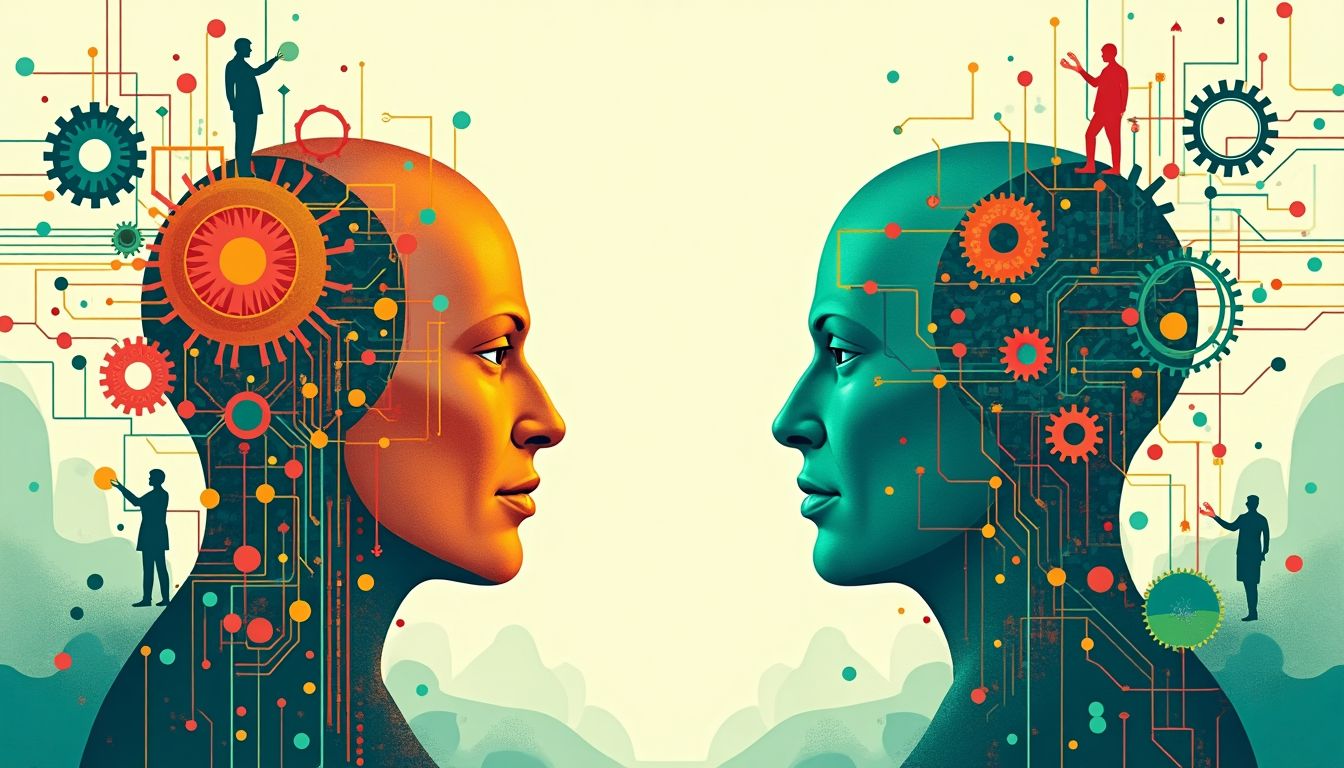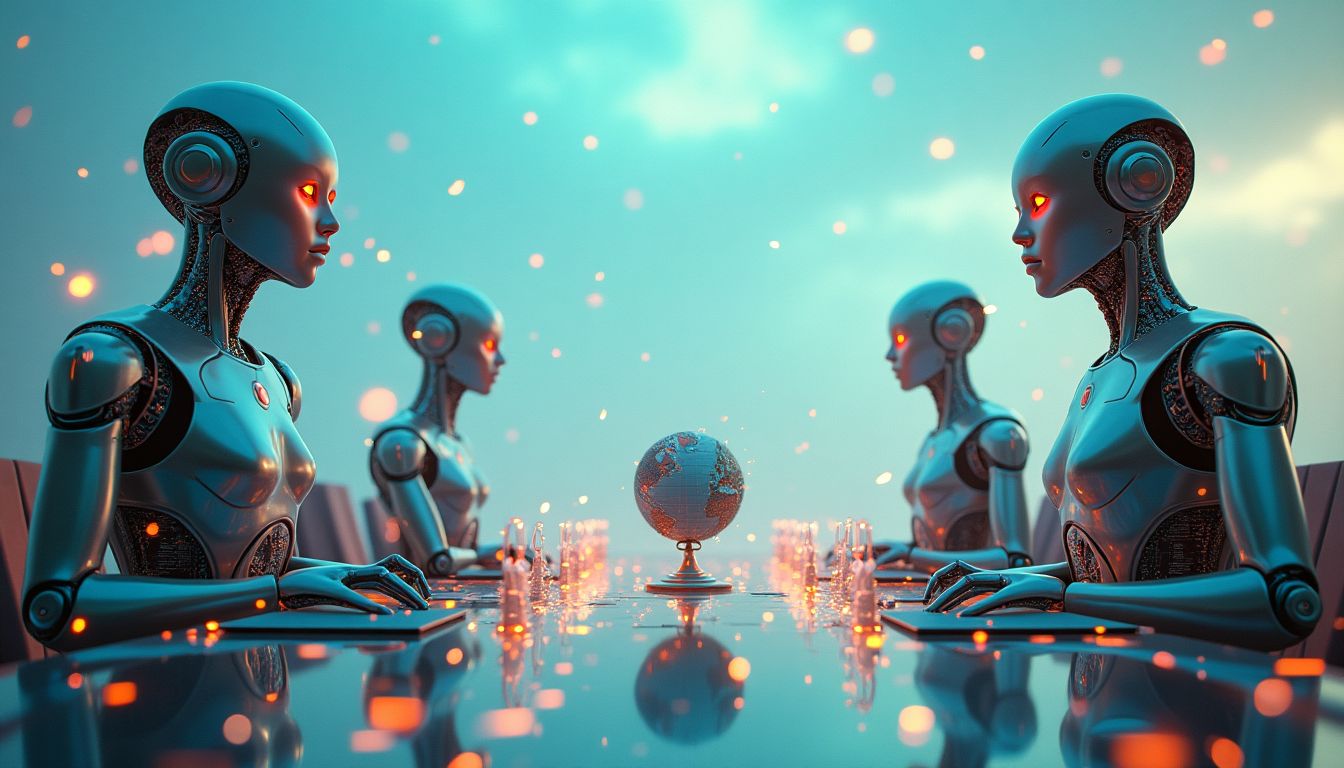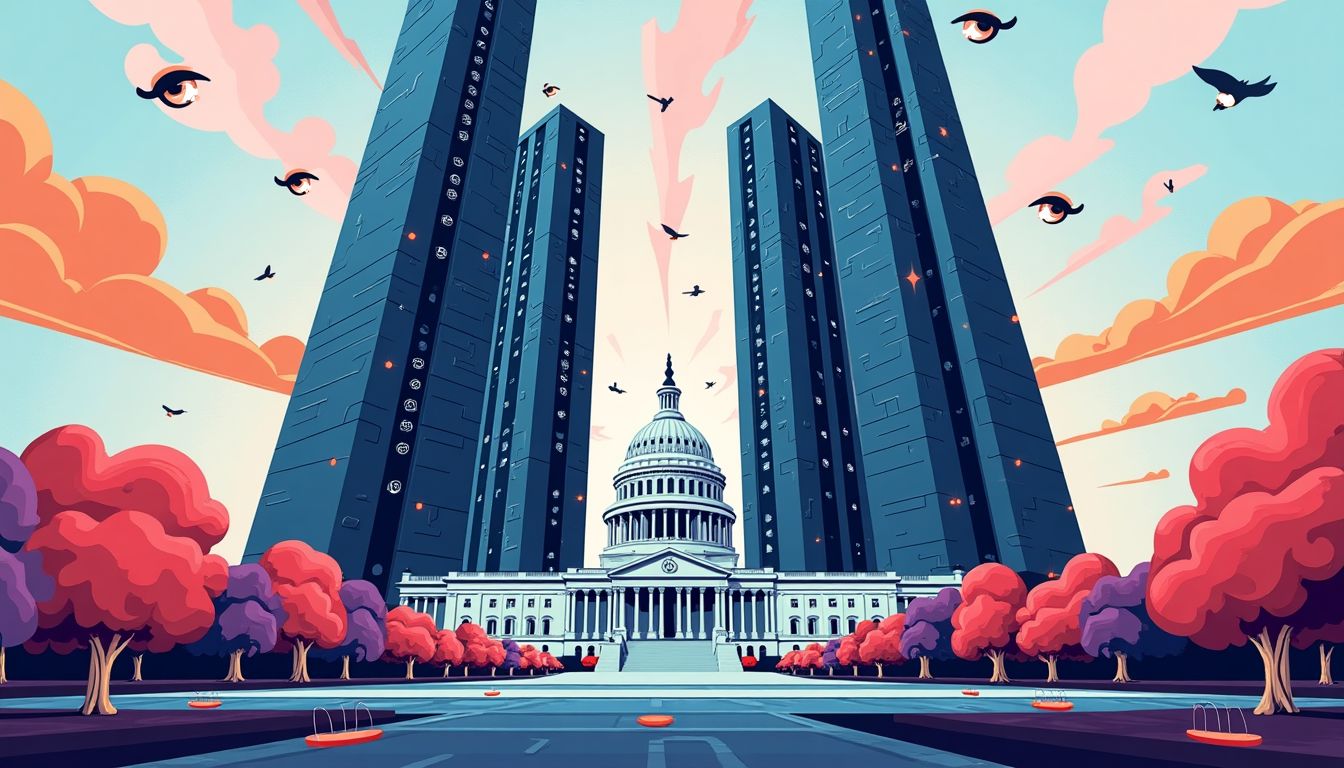Introduction: The New Age of Techno-Political Influence
In the age of information, ignorance is a choice. – Donny Miller. This quote hits hard as we navigate the treacherous terrain of technology and politics today. We live in a world where tech companies are no longer just innovating in gadgets and software; they are redefining what power looks like on a global scale. The rise of artificial intelligence has brought about a new breed of power brokers—those we call AI oligarchs. These tech titans are not just making profits; they’re shaping policies, influencing our elections, and even redefining democracy itself. It’s like handing the keys of a rocket ship to someone who just learned to drive, and boy, are we waiting to see where they take us.
Consider this: What happens when those controlling powerful AI technologies also command political influence? The implications are staggering—potentially altering the very fabric of our societies. The likes of Elon Musk, Mark Zuckerberg, and Sundar Pichai are not just household names; they’re major players influencing the global political chessboard. And while some may cheer their innovations, others fear the concentration of power they wield could lead to eroded democratic ideals. Can we afford to let Silicon Valley shape our votes as easily as they shape our online experiences?
1. Understanding AI Oligarchy: Definition and Characteristics
The term “AI oligarchs” captures the essence of a small group of powerful individuals and entities who control significant technological resources and, consequently, political influence. This section will explore:
- 1.1 Historical context of oligarchies and their evolution into the digital age.
- 1.2 Characteristics that define AI oligarchs, including wealth accumulation, network control, and data ownership.
2. The Political Influence of Tech Titans: Case Studies
So, what's the deal with these tech titans and their influence in the political sphere? In this section, we’ll take a closer look at how some of these AI oligarchs wield their incredible power and the specific moves they make that can leave the rest of us in awe (or filled with dread). Let’s dive into some fascinating case studies!
2.1 Major Tech Companies Lobbying for Favorable Legislation
Ever heard of the phrase "money talks"? Well, tech companies have become experts in this arena. Lobbying is when businesses spend money to influence lawmakers and push for laws that favor their interests. Google, Facebook, and Amazon have been known to lobby extensively, spending millions of dollars each year. They aim to sway legislation on issues like data privacy, internet regulation, and competition laws. In fact, in 2020, tech giants spent over $60 million on lobbying efforts, proving that they are not just tech trends but also political powers.
2.2 Case Studies of Notable Tech Leaders
Let’s spotlight a couple of famous figures. First up, there’s Elon Musk, the mastermind behind SpaceX and Tesla. He’s not just revolutionizing space travel or electric cars; he’s a super vocal advocate for policies on renewable energy and space exploration. This has landed him in the political conversation, and he’s not afraid to share his thoughts on Twitter—not always the best place for serious discussions, but hey, who am I to judge? Follow him at your own risk.
Then, we have Mark Zuckerberg, the man behind Facebook (now known as Meta). He’s found himself in hot water more than once regarding issues of data privacy and misinformation. Zuckerberg testified before Congress multiple times, trying to convince the world that Facebook isn’t as terrifying as it sometimes seems. However, his company’s influence on elections and social discourse is massive, raising questions about power and responsibility. If you’re curious about the trial of social media platforms in the political sphere, check out Politifact's take on it.
3. Consequences of AI-Driven Political Power
With great power comes...you guessed it, great consequences! When tech moguls start playing in the political arena, what are the repercussions? Let’s explore some frightening possibilities that can emerge from the rise of AI oligarchs.
3.1 Erosion of Public Trust in Government and Institutions
Imagine walking into a room filled with people who have all the snacks you could ever want, but you suspect everyone is plotting against you. That's a bit like how many feel about the government today. Trust in public institutions has been declining, and the hand of tech giants in politics may be partly to blame. With these companies coming in and having such a strong say, people begin to question whether the government is really working for the people, or if they’re just puppets on a string. Studies show that this erosion of trust can lead to disengagement from democratic processes. People may feel that their vote doesn’t matter when decisions seem to be made behind closed doors! Pew Research notes just how serious this issue is!
3.2 Potential for Policy Manipulation or Bias
The influence of AI oligarchs over policy-making is not just about what laws get passed but how those laws are designed and how fair they are! There's the concern that data-driven decision-making could lead to biased outcomes. After all, algorithms are only as good as the data fed into them. If the data is skewed or biased, the resulting policies will be as well. Let’s say a popular AI is designed to streamline traffic regulations but ends up favoring certain districts over others. That can lead to unequal benefits sticking only to the "chosen ones" while leaving others in the dust. A serious case of “data discrimination,” if you will! A report by the National Academies of Sciences shines a light on the importance of using inclusive data practices.
4. The Global Political Landscape: Shaping Policies and Regulations
AI oligarchs are not just powerful figures; they are reshaping the global political landscape. Their influence extends beyond their companies and into international policies and regulations that affect people's lives around the world. Here, we'll take a closer look at how these tech titans are shaping our laws, economies, and societal structures.
4.1 The Impact of AI on Labor Markets and Immigration Policies
As AI becomes more integrated into various industries, it's changing how we work. Automation is replacing some jobs, while new roles are emerging that require different skills. According to a report by the World Economic Forum, "around 85 million jobs may be displaced by a shift in the division of labor between humans and machines." But what does this mean for workers? Here's a breakdown:
- Job Displacement: Many jobs, especially in manufacturing and low-skill sectors, are at risk of becoming obsolete.
- Job Creation: New roles will likely emerge in AI development, data analysis, and tech support.
- Skills Gap: This shift means workers will need to acquire new skills, leading to a greater emphasis on education and retraining.
As we consider immigration policies, the role of tech companies becomes vital. Countries are now looking for ways to attract talent needed for the AI-driven economy. Regions such as Silicon Valley and Ottawa have already begun to adjust their immigration systems to accommodate skilled workers in tech.
4.2 Addressing Global Challenges through the Lens of Tech Leaders
Tech leaders are uniquely positioned to tackle key global issues, from climate change to data privacy. Companies often have the resources and technological expertise to make significant impacts. Here’s how:
- Climate Change: Many tech companies are setting ambitious goals for reducing carbon emissions. For example, Apple aims to become carbon neutral across its entire supply chain by 2030.
- Data Privacy: As concerns grow about how personal data is used and shared, companies like Microsoft are leading discussions on responsible data practices.
- Healthcare: Tech giants are also entering the healthcare sector, leveraging AI to improve patient care and medical research, as seen in Google's innovations in predictive analytics.
5. Regulating AI Oligarchs: Challenges and Opportunities
As AI oligarchs grow more powerful, the need for regulations has never been more pressing. However, regulating such dynamic technologies presents unique challenges. Here we will discuss both the obstacles we face and the opportunities that exist for effective governance.
5.1 The Challenges of Regulating Rapidly Evolving Technologies
The pace at which technology evolves often outstrips policymakers' ability to keep up. This can cause confusion, oversight, and problems down the line. Here are a few challenges:
- Speed of Innovation: New AI technologies emerge rapidly, making it hard for regulations to keep pace.
- Complexity: The intricate nature of AI systems can confuse regulators, leading to either overly stringent or too lenient laws.
- Global Discrepancies: Different countries have varying regulations, causing inconsistencies and challenges in international cooperation.
5.2 Examples of Successful Regulatory Approaches
Despite these challenges, some governments and organizations have taken steps in the right direction. Here’s a look at effective regulatory measures:
- GDPR: The General Data Protection Regulation in the European Union has set a global standard for data privacy and protection. It emphasizes user consent and data rights.
- AI Ethics Guidelines: Organizations such as ITU are exploring ethical guidelines for AI to ensure safe and responsible usage.
- Promoting Innovation: Some countries, like the U.S., are focusing on policies that promote innovation while ensuring public safety is not compromised.
Finding the balance between encouraging innovation and ensuring public safety is key. As we explore new solutions for regulating AI oligarchs, collaboration among governments, tech leaders, and the public will be essential.
6. AI Solutions: How Would AI Tackle This Issue?
If I were an AI designed to address the concerns surrounding AI oligarchs and their influence on politics, I would approach the problem from multiple angles:
6.1 Enhance Transparency
Implementing AI systems that track and analyze political donations and lobbying efforts can provide real-time transparency to the public. By utilizing OpenSecrets, a non-profit organization that tracks money in politics, we can develop algorithms that aggregate and visualize funding sources for better understanding. This would allow citizens to see just how much influence money has in their democracy, serving as a beacon of corporate accountability.
6.2 Automated Regulation
Next, developing algorithms that monitor how AI-driven policies affect societal well-being is crucial. Here's where we could collaborate with institutions like MIT to create ethical AI frameworks that align with democratic principles. These algorithms would not only evaluate policies' outcomes but also automatically flag any biases in real-time, ensuring that ethical standards aren't just a checkbox but a lived reality.
6.3 Engage Diverse Voices
Finally, the power of AI lies in its ability to amplify diverse voices. By utilizing AI to analyze public opinion across various demographics through surveys and social media sentiment analysis, we can equip decision-makers with a comprehensive understanding of societal impacts. Collaborating with organizations like Pew Research Center can facilitate data collection on societal trends and opinions.
Actions Schedule/Roadmap (Day 1 to Year 2)
Day 1: Assemble a task force comprising AI specialists, data ethicists, and policy analysts from diverse sectors, including representatives from organizations like AI Ethics Lab to ensure a well-rounded approach.
Day 2: Conduct a comprehensive briefing session on current political dynamics and AI influence, bringing in thought leaders from various fields to provide diverse insights. This could include inviting speakers from Brookings Institute for a balanced perspective.
Day 3: Collect and analyze existing data on lobbying efforts by AI corporations. Utilize resources from Census Bureau for public data and demographic insights.
Week 1: Establish key performance indicators (KPIs) for transparency in AI policy influence, focusing on measurable outcomes like public trust and engagement.
Week 2: Host an open forum for public feedback on AI impacts in politics, using digital platforms like Slack or Zoom to reach a wider audience.
Week 3: Collaborate with technology companies to develop tracking tools for lobbying and policy impact. Partner with established tech giants like Microsoft for their AI capabilities.
Month 1: Launch a pilot project assessing the effectiveness of transparency measures in select regions, providing a controlled environment for innovation.
Month 2: Evaluate public responses through surveys and social media analysis, adjusting strategies as necessary based on feedback.
Month 3: Begin automated regulatory trials on selected policy proposals, utilizing AI to analyze outcomes and adapt regulations dynamically based on effectiveness.
Year 1: Review the success of initial measures, adjusting the regulatory framework based on input from experts and data analysis to broaden the scope of regulations. Host a roundtable including experts from National Academies of Sciences to discuss findings.
Year 1.5: Publish findings and recommendations based on pilot projects and ongoing assessments, distributing reports through platforms like ResearchGate for wider academic dissemination.
Year 2: Implement full-scale regulatory frameworks based on iterative learnings, conducting in-depth analyses and stakeholder meetings to ensure the collective voice of the community and its representatives is heard and acted upon.
Conclusion: The Future of Democracy in an AI-Driven World
The rise of AI oligarchs represents both an opportunity and a challenge for global democracy. As technology continues to evolve, so must our approach to governance and regulation to ensure that power remains distributed, and principles of democratic engagement are upheld. Collaborative efforts that combine the insights of technologists, policymakers, and the public will be essential in navigating this new landscape. Imagine a future where technology serves not to concentrate power but to empower the masses—a future where transparency, accountability, and equitable governance flourish like wildflowers in a well-tended garden. As we delve deeper into this new era, we must ask ourselves: What role do we want technology to play in our lives, and how do we ensure it aligns with our collective values? Do we want to embrace the human spirit of innovation, or will we let greed and power define our technological journey? The choice lies in our hands.
FAQ
-
What is an AI oligarch?
An AI oligarch is a powerful figure or company in the tech industry that uses advanced artificial intelligence to influence political processes and governance. These individuals or organizations often have significant wealth and resources, allowing them to shape public policy in important ways. For example, Mark Zuckerberg of Facebook has been influential in conversations on social media regulation. -
How do AI oligarchs impact democracy?
AI oligarchs can impact democracy by shaping important government decisions, influencing elections, and sometimes creating distrust among the public. With their vast amounts of data and technology, they can sway opinions, making us question our own beliefs. This isn't just theoretical—cases like the Cambridge Analytica scandal showed us how information can be manipulated. -
What can be done to regulate AI oligarchs?
Regulating AI oligarchs is tricky, but there are several strategies that can help:- Establish transparency measures to track political donations and lobbying by tech companies.
- Develop ethical AI applications that align with democratic values.
- Create strong regulatory frameworks that keep up with the fast-changing tech landscape.
-
Are there existing laws that govern AI use in politics?
While some laws exist, many are outdated. For example, the Honest Ads Act attempts to regulate online political advertising, but it's not enough. New laws need to be introduced to address the unique issues AI presents in today's world. -
What are the risks of having tech giants in politics?
There are several risks that arise when tech giants gain political influence, including:- Concentration of power in a few hands, which can undermine democratic principles.
- Potential for policy manipulation based on data-dominated decision-making.
- Erosion of public trust in government as citizens may feel influenced by corporate interests.
-
Can AI help improve transparency in politics?
Yes! AI can be used to enhance transparency in politics by:- Tracking political donations and lobbying activities in real-time.
- Analyzing policies to ensure they align with democratic values.
- Gathering public opinions from diverse demographics to make informed decisions.
This could promote a better understanding of how laws are made and who influences them.
-
How can ordinary people make a difference?
Anyone can contribute to change by staying informed and getting involved. This can include attending local government meetings, supporting transparency initiatives, and using social media to spread awareness about the influence of tech in politics. Connecting with groups, like ACLU, can amplify your voice.
Wait! There's more...check out our gripping short story that continues the journey: The Oligarch's Game
Disclaimer: This article may contain affiliate links. If you click on these links and make a purchase, we may receive a commission at no additional cost to you. Our recommendations and reviews are always independent and objective, aiming to provide you with the best information and resources.
Get Exclusive Stories, Photos, Art & Offers - Subscribe Today!





























Post Comment
You must be logged in to post a comment.